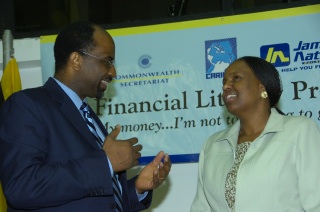Modern Slavery Because of Financial Illiteracy – Earl Jarrett
KINGSTON, Jamaica – Some Jamaicans are undergoing a modern form of slavery because of their lack of understanding of financial issues, says Fellow Chartered Accountant (FCA), Earl Jarrett.
According to Mr. Jarrett, poor financial decision-making is oppressing Jamaicans individually and holding back the nation’s progress. The general manager of Jamaica National Building Society (JNBS) was speaking at the finale of the Financial Literacy Project for students in Kingston earlier in June.
“Citizens oftentimes are not functionally literate, although they are educated,” he said, “the result is that people work hard all their lives and then find it difficult to survive when they retire.”
A 2003 study of Jamaica’s savings trends by Professor Neville Duncan of The University of the West Indies (UWI) showed that the savings rate was less than 20 per cent of the Gross Domestic Product. Mr. Jarrett said this was too low to provide the caliber of resources needed to stimulate economic growth.
The study showed that the savings rate needs to be doubled for the country to achieve social transformation and development, he said.
The country’s massive credit card debt is one of the signs that Jamaicans are not on the best financial path. He said interest rates on credit cards often amount to as much as 60 per cent per annum, yet press reports showed $14.4 billion in credit card debts in March.

Earl Jarrett, General Manager of the Jamaica National Building Society discusses the CARIMAC Financial Literacy project with Mrs. Cheryl Bruce, Economic Advisor, International Finance and Capital Markets Section, Commonwealth Secretariat. Mrs. Bruce was the keynote speaker at the Project Finale held on June 13..
Professor Duncan found that large sums were spent on hire purchase agreements, and the no-down payment plans ultimately required payments amounting to two or three times the value of the loan.
“Very little has changed today,” Mr. Jarrett said. Enticing advertisements promote prolonged credit through hire purchase agreements.
“Perhaps the most sinister of all is the payday loans,” he said. This puts many into poverty by assigning their salary to cover their expenses even before they are paid.
“It is tantamount to a form of modern day slavery,” he said. Those who take out such loans find themselves, “locked into a vicious financial cycle.”
Jamaicans today are more inclined to spend than save, he said. This shows up most starkly when some are faced with an unexpected illness or the frequently high cost of educating children.
A National Savings Committee was established in 1971 to promote a higher level of financial literacy in the population. This committee looked at the issues of budgeting, saving, money management and investment.
The concepts promoted by the National Savings Committee are as relevant today as they were then, he said. The country is battling many of these same issues as Jamaicans are faced with a raft of financial decisions, and many of the choices being made are the wrong ones.
“We live in a world driven by free market enterprise, and there is decreasing focus on important issues such as budgeting and planning, accounting for expenses and saving.”
The Financial Literacy Project implemented by CARIMAC is one attempt to address the problem. He told the audience, “We immediately saw that this project was a most beneficial way to reinforce the value of sound financial knowledge in our people, but more importantly in the minds of our students.”
More than 500 students from 12 high schools across the island participated in the project, the first of its kind. Aimed at students 14-17 years old, it sought to help improve their understanding and management of their money.
“What better place to start to correct this than in our schools,” Mr Jarrett said. “We should start with our young persons and get them energized about the benefits of good money management.”
The project was initiated with support from the Commonwealth Secretariat and Jamaica National Building Society.
Lessons covered included budgeting, debt management, business planning, and savings. An interactive teaching format was used to engage the interest of the students.
“I invite policy makers to look at this project,” he said. “It could be the platform to launch another national savings initiative.”



